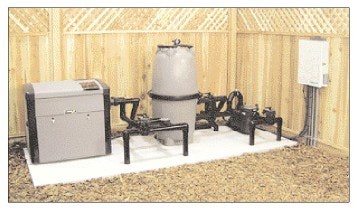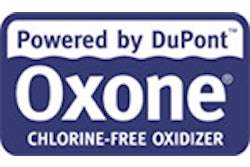
When visualizing the clear blue pool they'll soon have in their backyard, many prospective pool owners imagine diving into cool, refreshing water on a hot summer day. Few consider the shock of plunging into a chilly 65-degree pool. But that's what they may encounter if they want to jump in before July. And since many pool owners today want to use their pool as early as April, builders and dealers can help their customers get the most out of their pool by offering them a heater, which also adds nicely to the price of the total pool package.
But if imagining a dip in a warm, cozy pool isn't enough to convince customers to spend a little more on the front end of their investment, AQUA — and a few industry experts — have come up with more reasons why pool owners may want to equip their pool with a heater.
1. Extending The Season
"In cold-weather climates, a heater can extend the season," says Bill Aurthur, product manager for heating equipment for Sanford, N.C.-based Pentair Pool Products. "Depending on the climate, you can extend it early into the spring, about a month or month and a half, and extend it into the fall, about a month or month and a half."
And extending the season helps pool owners maximize the value of their swimming pool, says Richard Murphy, national sales manager, pool division for Lochinvar in Lebanon, Tenn. "You're making a rather large investment, and without the pool heater, you certainly limit the amount of time you can use that investment.
"Whereas with a pool heater, you can extend that season, and if you're in the Midwest or on the East Coast during the spring, the pool may not warm up. So if you get a couple days of warm weather and the pool is cold, they don't go in the pool. But if you have a heater, you can turn the heater on and warm up that water and get the value out of the swimming pool. And that's what you bought it for — to use it.
"For every day or month that pool sits there and you don't use it," Murphy says, "you're not really getting anything in return."
However, with a heater, the pool can be open and in use for more time each year, in which case "a couple thousand dollar investment on a heater is going to pay for itself in no time at all," says Tim Ruesch, product manager for Delavan, Wis.-based StaRite Industries.
For dealers, the more clients that extend their pool season, the better. "The bottom line is that it's going to be better for business," says Murphy. "If they open that pool sooner and close it later, they have to come in for more chemicals and services, and they may buy furniture or pool toys — the whole gamut."
2. Combos
Yet another reason more pools today are installed with heaters is there are more pool/spa combinations being built. "We have seen an increasing trend toward including a built-in spa with a built-in pool," says Pete Owenson, product manager for heaters and water features for Petaluma, Calif.-based Jandy.
"And that almost obviously necessitates some type of appliance to heat the spa.
"There are shortcuts you can take, and in cases where you do have pool/spa combos, you could get away with a spa-sized heater. But then you're making an investment just for the spa and you're ignoring the basic premise of increasing the usable time of the pool investment by not having a heater for the early and late parts of the season. If you have invested in a spa where you will need a heater, it certainly makes all the sense in the world to select a heater that can also cover that extended season time for the pool. So we're seeing pool-sized heaters used to heat those pool/spa combinations, which they certainly have no problem doing."
3. System Shock
Even in areas that stay warm year-round, consumers may want heaters. "It's a body-temperature thing," says Aurthur. "In some areas, the higher the air temperature and the colder the water, the greater the shock to the system when you jump in the water. So in high-temperature areas, they bring the pool temperature up, too, because if you jump into 68-degree water, it feels like you're freezing if it's 100 degrees out. Whereas if you bring that pool temperature up to 80 or 82, the difference in temperature is not such a shock to your body."
4. Save Time and Money
For those customers who already have a pool heater, it may be time for an update. "All heaters lose efficiency over time," says Ruesch. "They're never more efficient than they are at the initial install, whether it's because the exchanger is calcifying due to hard water or it's issues of condensation or sooting in the exchanger, which prevents heat from getting into the water."
Owenson concurs: "An older heater is going to have significantly less-efficient operation than a brand-new one. Over time, a heater may lose one or two, or if it's not maintained three or four percentage points of efficiency every year. So a heater that's 10 years old — and when it was brand new, it met the minimum efficiency — but at 10 years old, it may only be 60 to 65 percent efficient. So just replacing that heater with a new comparable heater is going to move you back up to 81 or 82 percent efficient and save you 15 or 18 percent on your heating costs."
Pool owners save money not only because they're using less fuel, says Ruesch, but also because "the sheer heat-up times will be so much quicker."
The good news is many consumers are willing to buy a newer, more efficient model. According to Aurthur, "In Southern California, we see probably 20 percent of our sales are going in the replacement market."
5. Just The Spa
"The in-ground spa market in and of itself is growing, and that's another application for heaters," says Aurthur. "Because yards are shrinking, and so in some cases you can't put in a pool, but you always have room for a spa, and that's another avenue for selling pool heaters: the in-ground spa by itself."
6. User-Friendly
As with most every other product on the market that employs electronics, heaters have become easier to use. "We've gone from the old analog where you had dial controls and really had to guess how warm the water was to more sophisticated digital controls," says Murphy. "With the old analog, there was a colormetric wheel and it went from red to blue and so you had to guess where 80 degrees was. So what you had to do was set a temperature and then measure the temperature of the pool, and if that was 80 degrees, then you marked a hash mark on the dial and that's where you kept your dial. It was a trial-and-error method."
Ruesch compares the old heaters to those found in hotel rooms that have a warmer/cooler dial. "You never seem to get it right and you're either too hot or too cold."
"But now," Murphy says, "you can actually set a defined temperature and hold it within a few degrees of that. With the old heaters, you were guessing: 'Am I at 85? I don't know.' So the technology has improved. The reliability is greater than it used to be."
Aurthur agrees: "With heaters today, with the digital capabilities, they are much more precise and more efficient and they also tie in with automatic control systems. Some heaters even have an RF function, so that you can just hit a remote button like you do with a TV or VCR and you can start the heater and make it go into spa mode."
Owenson has also noted improvements in the category. "Certainly the trend has been toward more user-friendly equipment. All of the manufacturers have added digital displays to their product. And we've just released our second digital heater.
"With this heater, you can actually set a specific temperature and our new digital control incorporates the time clock in the pool heater. So the heater actually controls the circulation pump, and that gives you a couple of advantages. After setting your normal filtration period, you set a desired pool water temperature, and if the pool is not up to that temperature when your circulation time had ended, the heater has the smarts now to override the time clock and keep the whole system running until it gets the pool where you want it."
Owenson adds that since this new heater now has control of the time clock, Jandy was able to add a freeze-protection circuit. "Using the water temperature sensors that pool heaters need, you can start the circulation pump and prevent damage in a lot of cases where you would have freezing pipes."
Newer pool heaters also include features that make them easier to service. For instance, Ruesch says that on StaRite's Max-E-Therm heater, after loosening four screws and opening the shell, technicians have 360-degree access to all the working parts, other than the combustion chamber. "And our control board also has some builtin diagnostics that help pinpoint any needs for troubleshooting: different switches that may have faulted or tripped due to standard use of the heater, whether it's an exhaust-temperature sensor or water-pressure sensor."
7. Low Profile
According to Pentair's Aurthur, "Heaters have become smaller in size. They're getting away from the big box look and they're more pleasing to the eye. If you don't want to, you don't have to hide them behind a fence or a bunch of bushes because they're not as unattractive as some of the old boxy looking ones were 15 years ago."
8. Easy To Keep
More good news for consumers who decide to invest in a pool heater is the fact that once a pool is heated, a lot of that heat can be retained if a thermal cover is used. "Using a blanket on the pool is probably the greatest thing you can do to control your heating costs," says Owenson. But he's reluctant to specify exactly how much heat can be conserved, since this is affected by various factors.
"It's a complicated issue due to the things that affect the water temperature. In still air, with no solar contribution, but no night sky, which is sort of a gray day, you're saving 30 or 40 percent of the heat loss. On a windy day, the cover saves you more than that because wind would otherwise be affecting the surface of the water. On a sunny day, the cover is actually adding heat by collecting heat from the sun and adding it to the surface of the water. And the sunrays that penetrate are reflected back into the water by the blanket as well. So it runs a whole range of being only very good in the case where it's not adding to the heat, it's just saving you, and then you get cases where wind and things make the cover significantly more helpful to the point of actually heating your pool with a cover."
Warm Is Good
Pool heaters today are more efficient, easier to use and they help pool owners get the most out of their investment. But there's yet another reason to have a heater: they make pools more fun. People don't want to feel like a Popsicle in their pool, even if their kids are willing to endure the cold water. Homeowners enjoy their pool when they can dive into warm, inviting water for their evening or weekend swim. And the more people use and enjoy their pools, the more friends they'll tell, and the more referrals you'll get.











































